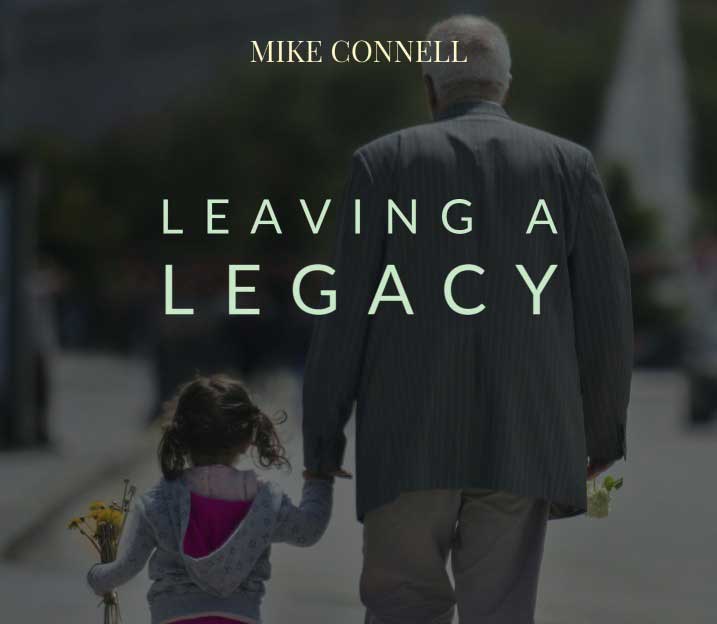 "Go make disciples..".
"Go make disciples..".
Leave a legacy of your walk in Christ. Impart what you have to other people, intentionally.
You are created for good works. God has designed you to accomplish something meaningful with your life.
IntroductionDeuteronomy 15:4. I want to finish the series I've been doing on Legacy. I want to talk about our Legacy in Christ.
ReviewWe talked about legacy; and about intentionally constructing a legacy for the next generation; thinking about what kind of life you live, what impact you'll make.
We saw that legacy was what you leave behind for others. Legacy is the imprint you left in this life, because you were here.
Yesterday at the funeral, we heard many different people talking about the legacy that Graham had left, and not all of it was good; but in the latter years as he came to Christ, he was able to intentionally work to overcome many things that had happened earlier in his life - and there was just great honour on him yesterday.
Everyone will leave a legacy - in fact we're called to. The Bible says: you are created for good works. God has designed you to accomplish something meaningful with your life; so when we connect with God, and begin to start to outwork His plan in our life, we start to begin to form a spiritual legacy - something that is from God - for others.
So legacy is visible and tangible; or intangible. If we think about Jesus' last mandate, His last words, which is the first priority for the church: “Go make disciples - teaching them to obey all things that I've commanded you.”
I'm going to rephrase it: He's saying to the church: this is not an option; this is a mandate: Leave a legacy of your walk in Christ. Impart what you have to other people, intentionally.
Main MessageAnother word that the Bible uses, which is like legacy, but not the same word, is the word inheritance, inheritance.
Legacy consists of everything you leave behind, which is intangible as well as tangible. When we think of inheritance, we think then of property, that is passed on from a person who has now died, and goes to their rightful heir, or those that are mentioned in their Will or testament.
So inheritance is part of a legacy; but a legacy is bigger than just the inheritance. The inheritance is the part that you give to someone else.
For example, if I was to die, and I own a house, that house is an inheritance for family. It's passed on to family. It's something tangible, but my legacy is much bigger than the house. My legacy consists of my life, and the impact it's made for Christ.
Deuteronomy 15:4, in the second part of the verse: “the Lord will greatly bless you, in the land the Lord your God is giving you, to possess as an inheritance”.
He's saying: “the Lord your God will give you…” - there's the first word, ‘give’; “…the land for you to possess”.
We're talking about a physical inheritance - in the Old Testament, the inheritance given to God's people was a physical piece of land in the Middle East. Notice it was given to Abraham, and all his descendants.
1) It is given.
2) It is an inheritance. It is part of something Abraham passed on, because God gave it to him.
3) They were required to possess it.
To possess means you have to arise, and drive out something that occupies it, or resists you getting what God wants. If you think about the Middle East, contention has been there for hundreds upon hundreds of years, over the piece of land God gave to Abraham. There's been a contention to possess it, for the people of Israel - who are model for us.
God said: there's the land, your inheritance - it is yours by right, I have given it to you. You own it, it is yours, your possession - but you can't just sit back. You have to arise, and by faith, displace what holds you back from enjoying it. That's the story of the Old Testament.